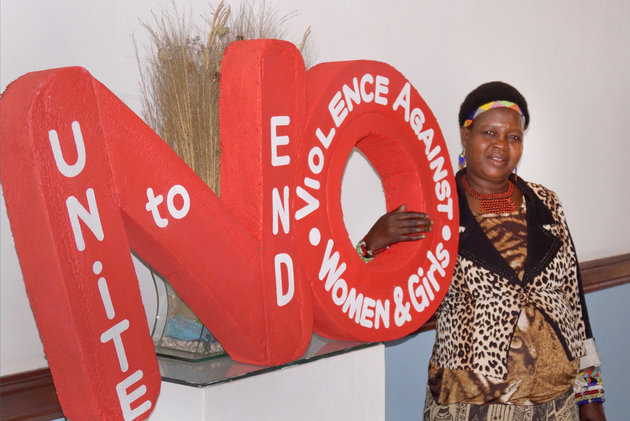In a country that has one of the highest rates of child marriage in the world, Malawi has established a new law preventing child marriage, and Chief Theresa Kachindamoto of the Dedza district in the Central Region of Malawi is enforcing it with a serious passion. In the last three years, she has dismantled 850 child marriages and, according to UN Women, she annulled over 300 child marriages in just one month.

For 27 years, Kachindamoto worked as a secretary at a city college in the district of Zomba in Southern Malawi. As the youngest of 12 siblings and a mother of five, she never expected to become a senior chief to over 900,000 people. However, when she was chosen as the next chief 13 years ago, she left her old life behind and, wearing traditional beads, red robes, and a leopard skin headband, she began visiting her people in their mud-walled, grass-thatched homes. She was surprised to witness girls as young as 12 with babies and teenage husbands, and she realized that she had to do something to help.
UNICEF reported that Malawi is believed to have one of the highest child marriage rates in the world. Underage marriage negatively affects girls’ development, interrupting their education and putting them at higher risk of domestic violence and early pregnancy. In addition, as Malawi is considered one of the world’s poorest countries, ranking 160th out of 182 nations, parents are eager to get their children married to remove the financial burden. That is why early marriages are especially common in rural areas, according to a report by Human Rights Watch. Many girls themselves also view marriage as the easiest way to escape a life of poverty.
Sexual Initiation
Outside of Kachindamoto’s jurisdiction, girls as young as seven years old are sent to camps known as ‘kusasa fumbi’ – which means ‘cleaning the dust’. At these camps, girls are reportedly taught ‘how to please men’ by performing sex acts and suggestive dances. Those who graduate can only do so by having sex with the teacher.
Even those girls that were not sent to these camps may find themselves the target of ‘hyenas’ – men who have been hired by village elders to take the virginity of young girls to prepare them for marriage. During these rites of passage, one in ten girls are infected with HIV, which sentences them to a difficult life and early death.
Changing Girls’ Lives
Even though Malawi’s parliament passed a law in 2015 deeming it illegal to get married before the age of 18, custom supersedes law in many villages. As a result, children can still be married by traditional leaders with parental consent.
Not happy with this, Kachindamoto decided to take a stand. She made 50 of her sub-chiefs sign an agreement to end child marriage in her area of authority. According to the Nyasa Times, she didn’t stop there. She also made the leaders annul any existing underage unions and send all the children involved back to school.
When she learned that four of her chiefs were continuing to approve underage marriages, Kachindamoto suspended them as a warning to others. She only hired them back once they had annulled the underage unions.
In order to ensure that the children are not being pulled out of school, Kachindamoto operates a network of parents who keep an eye on each other. If a parent is unable to pay for the school fees, Kachindamoto will often pay for them herself or find someone who can.
In a bid to keep the girls interested in school, she has reached out to women who grew up in the same towns. These women, which include Malawi’s female MPs, act as role models and speak about their jobs. Once the girls hear from these successful women, they are encouraged to continue their education.
Uphill Struggle
Since starting her mission to break up child marriages, Kachindamoto has received several death threats; however, she just shakes these off and continues working towards her goal of ending child marriage. Now, Kachindamoto’s latest project is to increase the legal marriage age from 18 to 21 in a bid to end rural poverty that has been increased by floods and droughts in recent years.
It may be an uphill struggle for the chief, but she believes that it is worth it. She believes that educated girls can provide more to the country than girls who are forced to settle for what tradition says they should.
Read Ethical Traveler's Reprint Policy.
